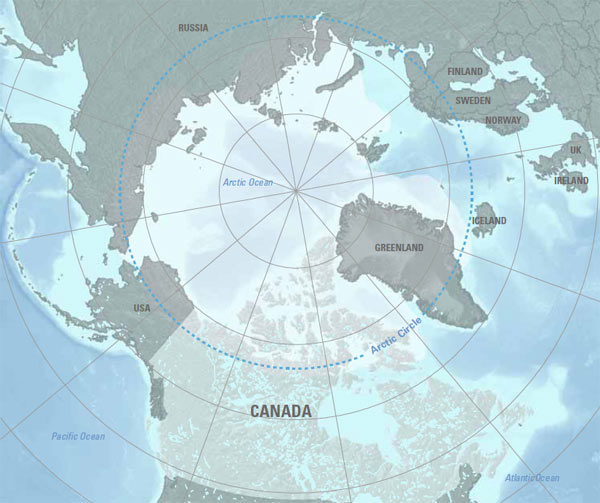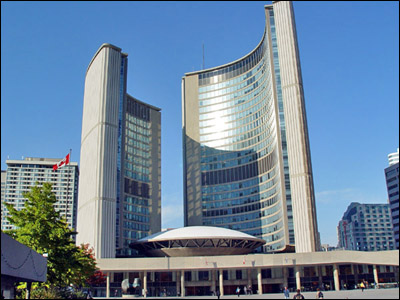In many ways, the past 20 years has brought unprecedented awareness of Canada’s northern frontiers. Better self-government has been introduced (the greatest example being the Nunavut Land Claims Agreement and the creation of Canada’s third territory); new economic initiatives have been installed through the Mackenzie Gas Project and Geo-Mapping for Energy and Minerals; and new army bases and military expansion has occurred, with a new training centre in Resolute Bay and expanding of the Canadian Rangers responsible for patrolling the arctic frontier.
All the above points have been laid out in Canada’s Northern Strategy, the 2009 guidelines in ensuring the economic and political growth of the country’s northern region. Of greatest concern for Canada and Stephen Harper’s economic goals is Russia, whose similar economic expansion and overlapping land claims pose a competitive risk to Canada’s arctic strategy. Last month, Russian Deputy Prime Minister Dmitry Rogozin declared the arctic as Russia’s “Mecca”, hinting that the territory is naturally theirs. Russian-Canadian relations have become frosty and even hostile in the past year. Stephen Harper publicly rebuked Putin to “get out of Ukraine” at the 2014 G-20 summit, and Canada’s decision to send troops to Ukraine to train Kiev government forces was castigated in April as “counterproductive and deplorable” by Moscow.
In many ways, Russia’s arctic policy parallels Canada’s, as it also utilizes a combination of economic and military aims. The 2008 document The State Policy of the Russian Federation in the Arctic Till 2020, explains that the national interest in the Arctic is not defensive in nature but rather for “the social and economic development of the country.” Starting with the Prirazlomnoye field in 2013 (which drills 300,000 barrels of oil a year), Russian oil industries have continued to move north, drilling in the Dolginskoye field in 2014, and as of January, 2015, looking into the Barents Sea. Both countries see the prospect of increased shipping as summers become longer in the North. Just as Canada sees the economic advantages of the Northwest Passage, the Russian Northern Sea Route (NSR) offers an alternative way of connecting Europe to Asia.
The main difference is that Russia considers the Arctic a sign of international security far more than Canada, and will thus act unilaterally to achieve its aims. The 2008 document makes semi-contradictory statements of the Arctic being both a realm of “mutually advantageous bilateral and multilateral cooperation” and being a “favorable operative regime…of general purpose armies of the Armed Forces of Russia.” Russian strategy of ensuring cooperation for environmental, economic, and scientific reasons has always been at risk of being eclipsed by its national insecurity. Hence statements calling the Arctic its “Mecca” makes it something uniquely Russian that cannot be achieved through a multilateral order. Western sanctions have stopped Arctic exploration momentarily, but through both increased Chinese interest in the NSR and oil, and the ability of U.S. companies to resume contracts through their foreign subsidiaries, it has become easier for Russia to skirt international norms to ensure its security.
Canada’s ability to react to Russia’s unilateral push is thus difficult, as Canada cannot compete with Russian displays of power. April’s annual NUNALIVUT operations showcasing Canadian efficacy in the North contained over 200 personnel operating in Nunavut, while Russia’s Northern Fleet military exercises involved over 38,000 troops. Similarly, Stephen Harper has promised to introduce three new icebreakers into the region, but procurement has been bogged down due to additional costs. In contrast, Russia has announced it will add fourteen new icebreakers to its fleet which is already much larger than Canada’s.
The result is an awkward foreign policy for Canada, a combination of confronting Russia directly when it can, while maintaining its role in a multilateral order. In March, the Defence Department claimed Canada had “been confronted by Russian warships and buzzed by Russian fighter jets” as it was patrolling the Black Sea. NATO officials responded that the alleged confrontation was false, and international law was followed by both sides of the conflict. For the Canadian government, some demonstration is necessary to show that Canada is fighting back against Russia’s expansion north. While Russia can send fighter jets close to NORAD airspace, for Canada to send its own planes over Russian airspace is implausible: the country is both militarily lacking, and part of an international order that would look down upon such a rogue action.
Canada’s best maneuvres are in its soft power capability, even if it appears unnecessary at times. Last month, Russia launched complaints against Canada for politicizing the Arctic Council, claiming “regrettably, driven by domestic policy agenda, the Canadian side attempted to promote…its misjudged approach to the current intra-Ukrainian conflict, which is alien to the Arctic Council.” On one hand this may be an abuse of Canada’s power, of using an organization devoted to cooperation and countering climate change towards a foreign conflict. Yet this is also Canada’s best asset: using its strong alliances and partnerships to further Canada’s claim to the North. It may be that Canada’s prospects for greater Northern sovereignty will rely on this tactic.





